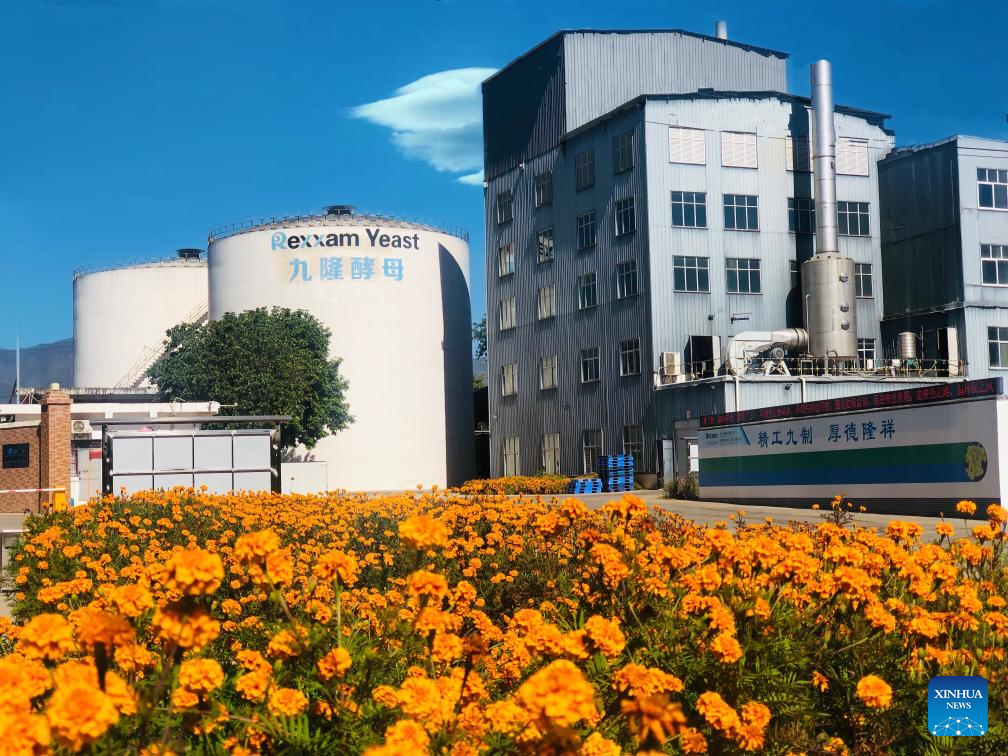Across China: Foreign investment expands southwest China's "sweet" industry chain
Source: Xinhua
Editor: huaxia
2025-07-23 14:22:16

This undated file photo shows the factory of Japanese firm Rexxam Co., Ltd. in Baoshan City, southwest China's Yunnan Province. (Xinhua)
KUNMING, July 23 (Xinhua) -- In the industrial park of Mile City, Honghe Hani and Yi Autonomous Prefecture of southwest China's Yunnan Province, Japanese firm Rexxam Co., Ltd. is nurturing a "sweet harvest," turning local abundant molasses resources into a thriving yeast industry.
The company has recently broken ground on a new factory, which is set to produce 20,000 tonnes of yeast annually for food and pharmaceuticals.
Yeast, a microorganism, has long been a key player in human activities such as brewing and baking. Rich in protein, vitamins and minerals, yeast offers many health benefits and is now widely used in food, medicine, health care and cosmetics.
Molasses, a by-product of sugar production from sugarcane, is the primary raw material for yeast production. It takes about 5 tonnes of molasses to produce 1 tonne of yeast. Yunnan is China's second-largest sugarcane production base, accounting for about 20 percent of the country's total sugar output.
According to statistics from Kunming Customs, in 2024, Yunnan exported nearly 22,000 tonnes of active yeast, a year-on-year increase of 11.8 percent, to 59 countries and regions worldwide.
"Yunnan's rich and low-cost molasses resources offer Rexxam a stable and sustainable raw material advantage. This not only supports industrial waste valorization but also brings both economic and environmental benefits," said Jia Yankun, representative of Rexxam's Kunming office.
Founded in 1960, Rexxam has been operating in China for nearly three decades since its entry in 1995. It is one of the longest-standing and most active Japanese investors in the region.
Starting with wood processing and flower cultivation, the company gradually shifted its focus to the biofermentation industry, aiming to develop a "sweet industry chain" centered on molasses.
In 2014, Rexxam built a yeast production line in Baoshan City, Yunnan, with an annual capacity of 5,000 tonnes. The factory primarily produces yeast products as feed, supplying yeast hydrolysates and yeast selenium to several large domestic feed companies. These products are also exported to Japan, Southeast Asia, Europe and other countries and regions.
The success of the Baoshan project has strengthened Rexxam's confidence in expanding its yeast business in China.
"We value not only Yunnan's raw material resources but also the increasingly open and inclusive business environment and the improving industrial infrastructure here," Jia added.
In June, at the 9th China-South Asia Expo, Rexxam signed a cooperation agreement with Mile City to invest 700 million yuan (about 98 million U.S. dollars) in the new plant. The first phase, with a capacity of 5,000 tonnes, is expected to start production in early 2027.
"The new plant will represent a significant upgrade in terms of production scale, product variety and overall facilities compared to our existing Baoshan factory," Jia said.
In the overall plan for the new Mile factory, Rexxam also intends to recycle the organic wastewater generated during yeast production into high-efficiency organic fertilizer, which will then be provided free of charge to local farmers for the cultivation of sugarcane and other crops.
Not just Rexxam from Japan, but an increasing number of foreign-invested enterprises from countries and regions such as the United States, Australia and Thailand are choosing to take root in China's southwestern region, driving rural revitalization.
Statistics show that, as of now, enterprises from 114 countries and regions around the world have invested in Yunnan, establishing a total of 7,105 foreign-invested enterprises and utilizing 24.98 billion U.S. dollars in actual foreign capital.
China's determination to open up has boosted foreign investment. According to data from the Ministry of Commerce, from January to May 2025, China saw 24,018 new foreign-invested enterprises established, representing a 10.4 percent year-on-year increase.
A survey by the Japanese Chamber of Commerce and Industry in China shows that more than half of the surveyed companies plan to "increase" or "maintain" their investment in China in 2025. ■



